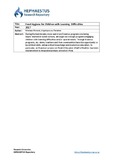| dc.contributor.author | Manesis, Nikolaos | |
| dc.contributor.author | Angelopoulou, Paraskevi | |
| dc.date.accessioned | 2021-04-09T06:47:42Z | |
| dc.date.available | 2021-04-09T06:47:42Z | |
| dc.date.issued | 2017-12 | |
| dc.identifier.issn | 20002610 | |
| dc.identifier.uri | http://hdl.handle.net/11728/11841 | |
| dc.description.abstract | During the last decade, more and more Erasmus programs are being imple mented in Greek schools, although not enough programs engaging children with learning difficulties and/or special needs. Through Erasmus programs, stu dents, teachers and their communities have the opportunity to boost their skills. enhance their knowledge and modernize education. In particular, an Erasmus+ project on Health Education (EduForHealth)1 has been implemented in integrated primary schools in West. | en_UK |
| dc.language.iso | en | en_UK |
| dc.relation.ispartofseries | The learning teacher magazine; | |
| dc.rights.uri | http://creativecommons.org/licenses/by-nc-nd/4.0/ | en_UK |
| dc.title | Food Hygiene for Children with Learning Difficulties | en_UK |
| dc.type | Article | en_UK |


